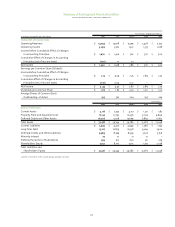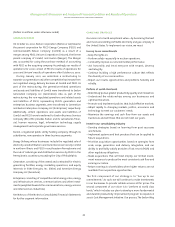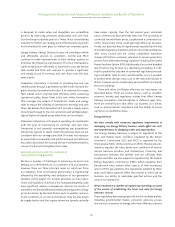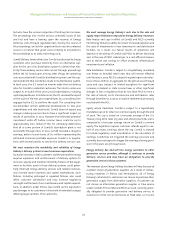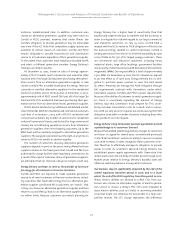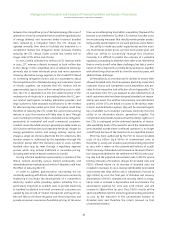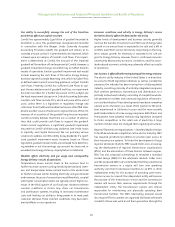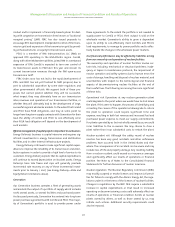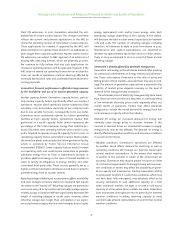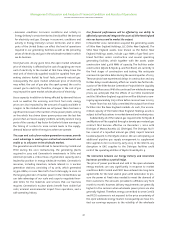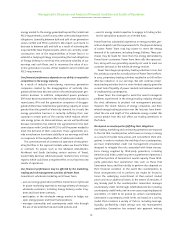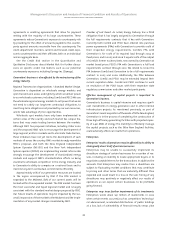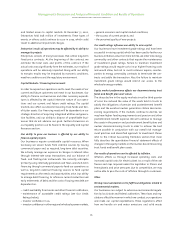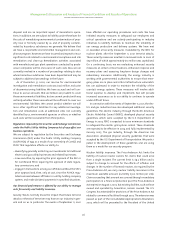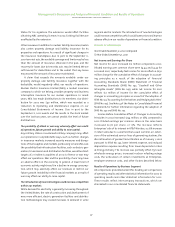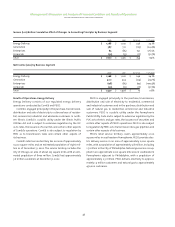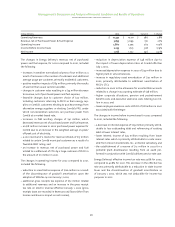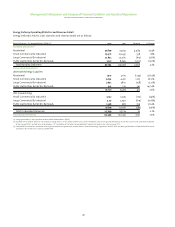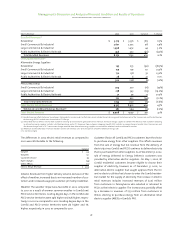ComEd 2002 Annual Report Download - page 33
Download and view the complete annual report
Please find page 33 of the 2002 ComEd annual report below. You can navigate through the pages in the report by either clicking on the pages listed below, or by using the keyword search tool below to find specific information within the annual report.
Plant life extensions. In 2001, Generation extended the esti-
mated lives of certain nuclear stations.This change in estimate
reflects the current and planned applications to the NRC to
renew the operating licenses of Generation’s nuclear stations.
These applications for renewal, if approved by the NRC, will
allow Generation to operate these plants for an additional 20
years longer than originally authorized. Nuclear station service
life extensions are subject to NRC approval of an extension of
existing NRC operating licenses, which are generally 40 years.
We continue to fully believe that any such applications for
renewal of operating licenses will be approved. However, if the
NRC does not extend our operating licenses for our nuclear sta-
tions, our results of operations could be adversely affected by
increased depreciation rates and accelerated future decommis-
sioning payments.
Generation’s financial performance is affected in large measure
by the availability and use of its nuclear generation capacity.
Nuclear capacity factors. Generation capacity factors, particu-
larly nuclear capacity factors, significantly affect our results of
operations. Nuclear plant operations involve substantial fixed
operating costs, but produce electricity at low marginal costs
due to low variable fuel costs. Consequently, to be successful,
Generation must consistently operate its nuclear generating
facilities at high capacity factors. Generation’s nuclear fleet
performed at a 92.7% capacity factor (which represents the
percentage of the total maximum energy that could be pro-
duced if facilities were operating full-time year round) in 2002
and is targeted to operate at a 94.2% capacity factor in 2003. In
calculating capacity factors, Generation’s nuclear fleet includes
the AmerGen plants and excludes the Salem generation facility,
which is operated by Public Service Enterprise Group
Incorporated (PSE&G). Lower capacity factors would increase
our operating costs and could require Generation to generate
additional energy from its fossil or hydroelectric facilities or
purchase additional energy in the spot or forward markets in
order to satisfy its obligations to Energy Delivery and other
committed third-party sales. These sources generally are at a
higher cost than Generation otherwise would have incurred to
generate energy from its nuclear stations.
Refueling outage scheduling at nuclear plants affects availability
and costs. Outages at nuclear stations to replenish fuel require
the station to be “turned off.” Refueling outages are planned to
occur once every 18 to 24 months and currently average approx-
imately 22 days in duration.We have significantly decreased the
length of refueling outages in recent years. However, when
refueling outages last longer than anticipated or we experi-
ence unplanned outages, we face lower margins due to higher
energy replacement costs and/or lower energy sales. Each
twenty-day outage, depending on the capacity of the station,
will decrease the total nuclear annual capacity factor between
0.1% and 0.4%. The number of refueling outages, including
AmerGen, will decrease to eight in 2003 from eleven in 2002.
Maintenance and capital expenditures are expected to
decrease by approximately $45 million and $10 million, respec-
tively, in 2003 as compared to 2002 as a result of fewer nuclear
refueling outages.
Generation is directly affected by wholesale energy prices.
Generation sells energy in the wholesale markets after meeting
its contractual commitments to Energy Delivery and other par-
ties. These sales expose Generation to the risks of rising and
falling prices in those markets,and cash flows may vary accord-
ingly.The amount of generation capacity that is exposed to the
volatility of market prices depends inversely on the level of
demand in the Energy Delivery companies.
The wholesale prices of electricity have generally been lower
than historical levels over the last few years. A continued trend
of low wholesale electricity prices could negatively affect our
overall results of operations. Factors that affect wholesale
energy prices include the overall demand for energy, fossil fuel
costs and excess capacity within the industry.
Demand for energy. An increased demand for energy will
normally cause energy prices to increase; however, if this
increase in demand drives an incremental increase in supply,
energy prices may be less affected. The demand for energy is
directly affected by weather conditions and economic conditions
in our service territories.
– Weather conditions. Generation’s operations are affected
by weather, which affects demand for electricity as well as
operating conditions. We manage our business based upon
normal weather assumptions. To the extent that weather
is warmer in the summer or colder in the winter than we
assumed, Generation may require greater resources to meet
its contractual requirements to Energy Delivery.Extreme sum-
mer conditions or storms may affect the availability of gener-
ation capacity and transmission, limiting Generation’s ability
to send power to where it is sold.These conditions,which may
not have been fully anticipated, may adversely affect us by
causing Generation to seek additional capacity at a time
when wholesale markets are tight or to seek to sell excess
capacity at a time when those markets are weak. Generation
does incorporate contingencies into its planning for extreme
weather conditions, including reserving capacity to meet
summer loads at levels representative of warmer than normal
weather conditions.
Management’s Discussion and Analysis of Financial Condition and Results of Operations
exelon corporation and subsidiary companies
31




